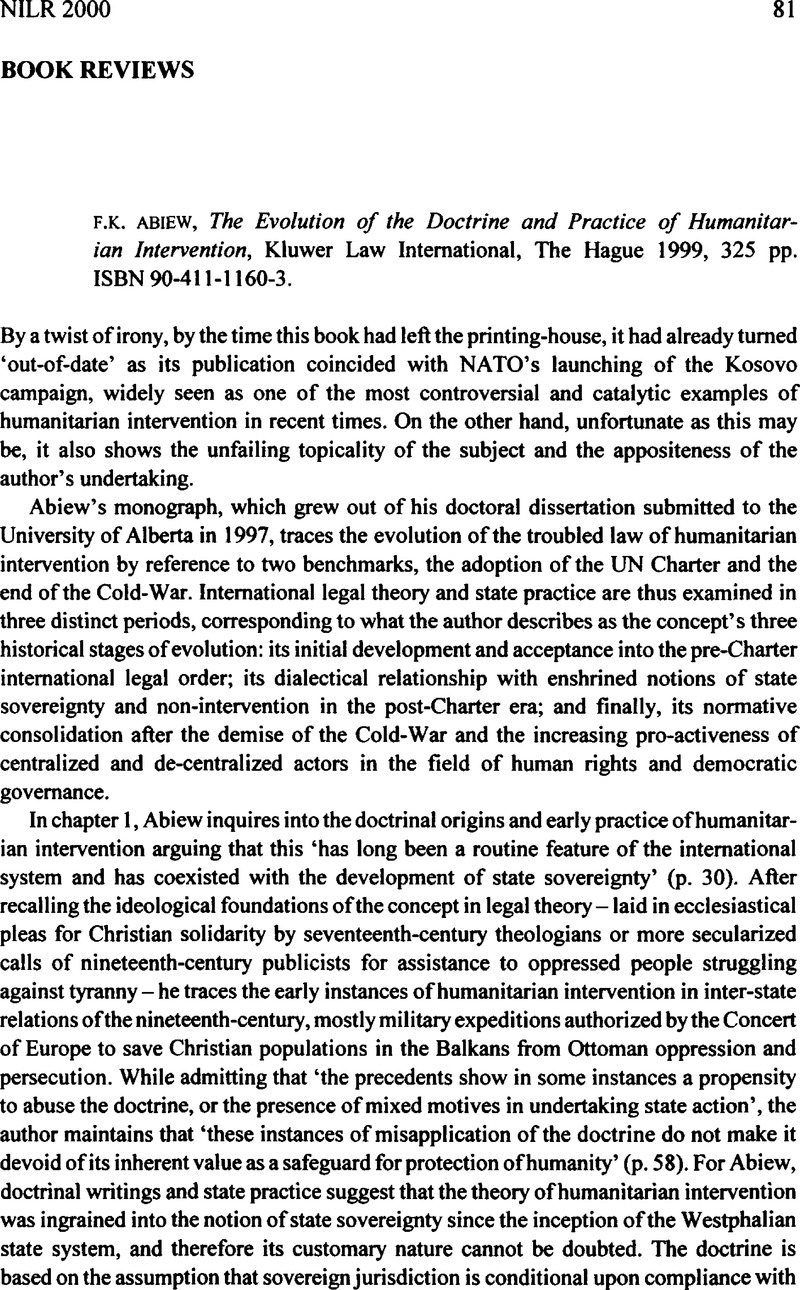No CrossRef data available.
Article contents
F.K. Abiew, The Evolution of the Doctrine and Practice of Humanitarian Intervention, Kluwer Law International, The Hague1999, 325 pp. ISBN 90-411-1160-3.
Review products
Published online by Cambridge University Press: 21 May 2009
Abstract

- Type
- Book Reviews
- Information
- Copyright
- Copyright © T.M.C. Asser Press 2000
References
1. Compare the view of Ian Brownlie who, in the context of the ICJ proceedings concerning Legality of Use of Force, maintained that ‘humanitarian intervention has no legal authenticity whatsoever’, that ‘there is no evidence of such a “doctrine” in customary international law’, and that ‘reliable authority covering a period of thirty years has failed to recognize a principle of humanitarian intervention’; see Request for the Indication of Provisional Measures, Oral Pleadings, CR 99/14.
2. On this, see the critical remarks by Charney, J.I., ‘Anticipatory Humanitarian Intervention in Kosovo’, 93 AJIL (1999) p. 841.CrossRefGoogle Scholar
3. See, for instance, Krisch, N., ‘Unilateral Enforcement of the Collective Will: Kosovo, Iraq, and the Security Council’, 3 Max Planck Yearbook of United Nations Law (1999) p. 87Google Scholar, and Henkin, L., ‘Kosovo and the Law of Humanitarian Intervention’, 93 AJIL (1999) pp. 826–827.CrossRefGoogle Scholar
4. As Judge Higgins has recently cautioned, ‘we are witnessing not mere imaginative lawyering within the UN to achieve a desirable end and alleviating the suffering, but the passing outside of the UN altogether of the decision making powers reserved under the Charter to the Security Council. As we wrestle with this dilemma, the long term implications may be considerable’; see Higgins, R., ‘International Law in a Changing International System’, 58 Cambridge Law Journal (1999) p. 94.Google Scholar
5. As it was noted in relation to the war in Kosovo, ‘NATO’s action in Kosovo is thus best be seen as an exception from which may be derived a few useful lessons for the future rather than as the future itself; see Franck, T.M., ‘Lessons of Kosovo’, 93 AJIL (1999) p. 859.CrossRefGoogle Scholar
6. See Annual Report of the Secretary-General on the Work of the Organization, A/54/1 of 31 August 1999, para. 66. And elsewhere, referring to the dilemma of so-called ‘humanitarian intervention’, he observed: ‘on the one hand, is it legitimate for a regional organisation to use force without a UN mandate? On the other, is it permissible to let gross and systematic violations of human rights, with grave humanitarian consequences, continue unchecked? The inability of the international community to reconcile these two compelling interests in the case of Kosovo can be viewed only as a tragedy’; interview published in The Economist, 18 September 1999.


